Clifford Garstang's Blog, page 21
December 5, 2021
Coming Soon–2022 Literary Magazine Rankings
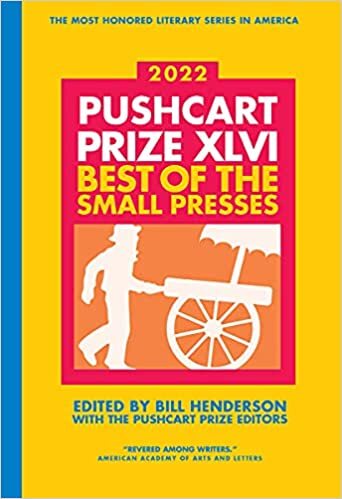
Stay tuned! Over the next few days, I will be updating the Literary Magazine Rankings to include the Pushcart Prizes and Special Mentions from the 2022 edition. Check back here or subscribe to my newsletter on the Contact page.
Unfamiliar with the rankings? Go here to explore the 2021 rankings.
November 30, 2021
2021 Reading–November
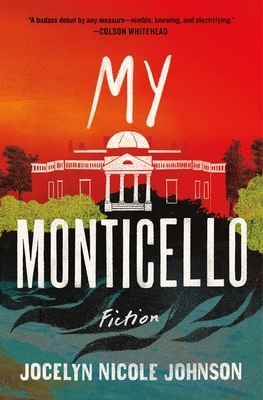 My Monticello by Jocelyn Nicole Johnson
My Monticello by Jocelyn Nicole JohnsonMy Monticello by Jocelyn Nicole Johnson is a collection of several stories and a novella. The opening story, “Control Nego,” is dynamite and is told in the form of a letter from an academic to his illegitimate son. The story appeared in the Best American Short Stories anthology and was worthy of that honor. I also liked the story that appeared in Prime Number Magazine, the magazine I used to edit, five years ago (after I had left the magazine, so I had nothing to do with it). The collection also includes a list story and some other gimmicks, and those provide for some variety. The bulk of the book, however, is the title novella, “My Monticello,” and it is powerful, especially knowing that the author lives in Charlottesville VA, not far from where I live and the location of the Unite the Right rally of white supremacists. It’s not hard to imagine the troubles that have occurred there happening again and taking on an apocalyptic dimension as depicted in the story. Fiction? Or prophesy?
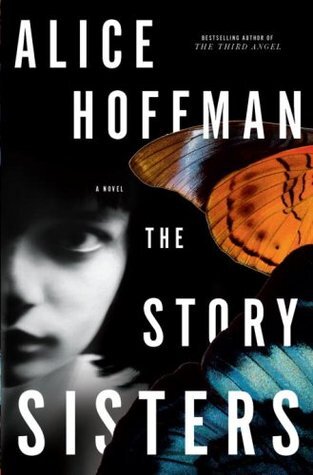 The Story Sisters by Alice Hoffman
The Story Sisters by Alice HoffmanThe Story Sisters by Alice Hoffman is about three sisters, Elv, Meg, and Claire Story who grow up on Long Island with their mother after their parents’ divorce. (At which point he virtually disappears from the girls’ lives and the book, which seemed an odd loose thread.) Elv, the eldest of the sisters, is the victim of child abuse at the hands of a teacher and this has a huge impact on her life, driving her to create an imaginary world with its own language and later to practice dangerous behaviors. She doesn’t tell anyone—not uncommon in real life, I gather—but as a result no one knows how to help her. She goes in a bad direction, which impacts her sisters’ lives, too. I found the book needlessly maudlin and melodramatic.
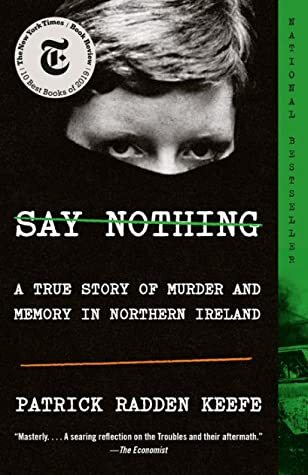 Say Nothing by Patrick Radden Keefe
Say Nothing by Patrick Radden KeefeSay Nothing: A True Story of Murder and Memory in Northern Ireland by Patrick Radden Keefe was my book club’s selection for November. The writing is outstanding and gripping, and while the broad outline of the Irish Troubles was known to me, the book offers detail and a perspective that was new. It was fascinating to read about some of the key players within the IRA and some of the background of the conflict. Something I was completely unaware of was the “Belfast Project,” a collection of interviews with both Loyalists and Republicans that was lodged at Boston College. Those interviews became a liability for BC as UK authorities sought to get access to them in order to prosecute various players for crimes committed. Ultimately, as the book discloses at the end, BC returned the interviews to the subjects in an attempt to wash its hands of the project.
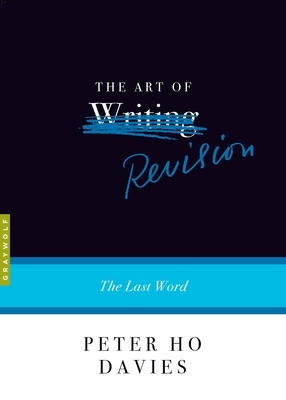 The Art of Revision by Peter Ho Davies
The Art of Revision by Peter Ho DaviesThe Art of Revision by Peter Ho Davies is a short book in the Graywolf Press “Art of . . .” series. I like Davies’s work and this is well-done, but it isn’t quite what I expected. The examples used are often two published versions of the same story or anecdote, demonstrating what has changed from one version to the next. Sometimes he’s looking at the same facts used in the work of different writers, how various authors have used, for example, the basis of a Hemingway story for their own purposes. This is revision, yes, but it isn’t quite what I was expecting as I work on a “revision” of my current work in progress. Yes, I intend to do more than mere editing, but I’m also not creating a separate and distinct work. I’m revising, not recreating something I already once considered finished. Still, it’s a recommended read for writers.
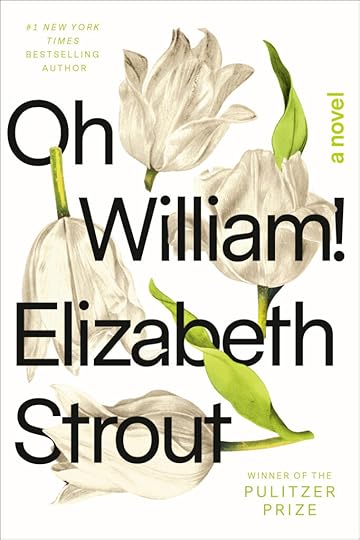 Oh William by Elizabeth Strout
Oh William by Elizabeth StroutOh William by Elizabeth Strout is another quiet book where not much happens. And yet, the telling is everything, because the character of Lucy Barton is fascinating and has such a distinct voice. Here, Lucy is still mourning the death of her husband David, whom she married after she left William, her first husband and the father of her daughters. She had gotten to know William’s mother well, and has remained friends with William, despite learning of his numerous infidelities. One focal point for the book is that William has learned, late in life, that he has a half-sister, and he invites Lucy with him to find out about her—not necessarily to meet her, but to learn what her life is like. This is the most suspenseful part of the book, in my view, as discussions of family secrets often are. I’m sure this won’t appeal to everyone, but I liked it a lot.
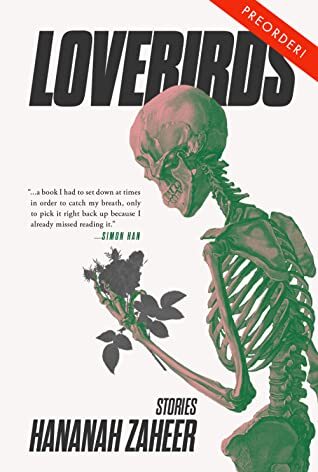 Lovebirds by Hananah Zaheer
Lovebirds by Hananah ZaheerLovebirds by Hananah Zaheer is a chapbook of very short stories, mostly about women in oppressive relationships or families. The oppression is, in most cases, a result of traditional Islamic values and views of the role of women and their appropriate behavior. While respectful of Islam, the book can be read as an indictment of the way some in the faith treat women, and a call for change.
November 18, 2021
I’ve Got Questions for David R. Roth
Editor’s Note: This exchange is part of a series of brief interviews with emerging writers of recent or forthcoming books. If you enjoyed it, please visit other interviews in the I’ve Got Questions feature.
 The Femme Fatale Hypothesis by David R. RothWhat’s the title of your book? Who is the publisher and what’s the publication date?The Femme Fatale HypothesisRegal House PublishingNovember 19, 2021In a couple of sentences, what’s the book about?
The Femme Fatale Hypothesis by David R. RothWhat’s the title of your book? Who is the publisher and what’s the publication date?The Femme Fatale HypothesisRegal House PublishingNovember 19, 2021In a couple of sentences, what’s the book about?As Rose Geddes’s late-stage lung cancer progresses and her husband Kelsey’s ability to care for her diminishes, their neighbor, June Danhill, stumbles into the middle of this couple’s intersecting crises. It isn’t long before June realizes that Rose wants more from her than she is willing to give. Love and loss, family secrets, a long-forgotten keepsake, and the sexual cannibalism of the false garden mantid all fuel this dark drama that tests the thin line between mercy and murder.
What’s the book’s genre (for fiction and nonfiction) or primary style (for poetry)?Adult Literary Fiction
What’s the nicest thing anyone has said about the book so far?Wow – so many people I admire agreed to write blurbs for the book and they all wrote really terrific comments. It’s impossible to pick one.
What book or books is yours comparable to or a cross between? [Is your book like Moby Dick or maybe it’s more like Frankenstein meets Peter Pan?]Though it’s not apples to apples, I like to think of Kent Haruf’s Our Souls at Night as being a book in the same spirit as mine; older characters living quite lives and dealing with aging, grief, loss and the shadow of death.
Why this book? Why now?The period during which I quit my job, returned to school for my MFA, and began to focus on my own fiction was marked by the deaths of several people close to me. Experiencing those deaths got me thinking about how we die in this culture, why we fear it so much, and why we tend to outsource the experience to professionals whose livelihoods depend on our staying alive, whether we want to or not. I wanted to explore some of those questions in a fictional context.
Other than writing this book, what’s the best job you’ve ever had?I was the head writer and director for a small firm that created interactive training courses involving behavior in corporate settings, including things like sexual harassment, bribery, insider trading. I really enjoyed exploring non-linear storytelling, allowing learners to pick paths and see consequences. It was great fun writing dramatic scenes and then seeing how the page translated to the screen.
What do you want readers to take away from the book?My hope is that readers both enjoy the story for what it is – a few months in the lives of three people facing difficult circumstances – and that it inspires them to consider how they think their own mortality.
What food and/or music do you associate with the book?A hearty soup, a warm baguette, Taleggio and fig jam delivered on a bed tray table with Samuel Barber’s Adagio for Strings playing in the background.
What book(s) are you reading currently?Umberto Eco’s The Mysterious Flame of Queen Loana
Stephen Jenkinson’s Come of Age: The Case for Elderhood in a Time of Trouble
 David R. Roth
David R. RothLearn more about David at his website.
Follow him on Facebook.
Buy the book from the publisher (Regal House Publishing), Amazon, or Bookshop.org.
October 31, 2021
2021 Reading — October
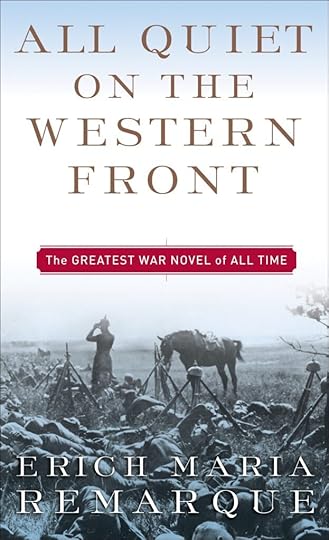 All Quiet on the Western Front by Erich Maria Remarque
All Quiet on the Western Front by Erich Maria RemarqueAll Quiet on the Western Front by Erich Maria Remarque is the classic story of the First World War told from the point of view of Paul, a young German soldier. It’s hard to believe that I’ve never read this before, as it seems to me when I was in high school it was probably required reading in many places. The horror of the book comes in waves. At some points, the German soldiers are bored, then they’re frightened. Paul is given leave and goes home, which is a tough adjustment for him, and then is at training where he encounters Russian prisoners of war who are also suffering. When he returns to his unit at the front, he finally comes face to face with the enemy and kills a man in the trenches, a scene that is gruesome and brings the folly of war home for him—and the reader.
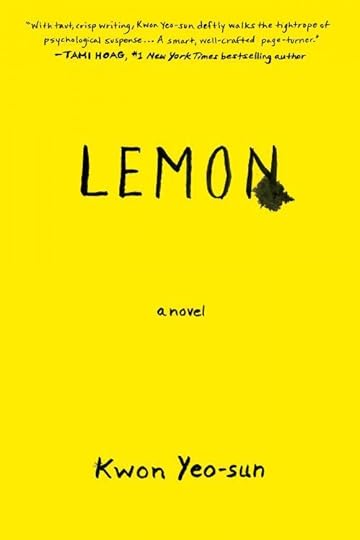 Lemon by Kwon Yeo-sun
Lemon by Kwon Yeo-sunLemon by Kwon Yeo-sun is an odd little book I reviewed for the New York Journal of Books. Translated from Korean, the story is basically a murder mystery at first, but it becomes more than that. A beautiful high school student is murdered after being seen with a popular boy, and there are a couple of suspects, but insufficient evidence to charge anyone with the crime, so it remains unsolved. The boy she was with is one suspect, but he’s from a wealthy family and so not seriously investigated. The other suspect is a poor boy who is questioned intensely by a detective who doesn’t believe the boy’s story or the alibi his sister provides. The book is a bit confusing because of point-of-view choices. The first chapter appears to be told from the point of view of the murdered girl’s younger sister, but the next chapter is told from the point of view of a friend of the girl, four years later. We also get the point of view of another friend who, it turns out, was with the poor boy on the night of the murder. All of these people are affected by the murder, even many years later.
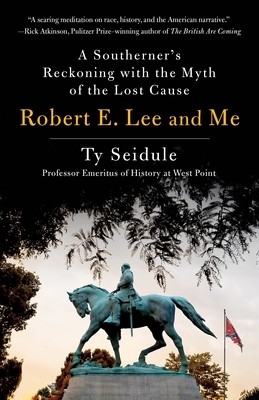 Robert E. Lee and Me by Ty Seidule
Robert E. Lee and Me by Ty SeiduleRobert E. Lee and Me: A Southerner’s Reckoning with the Myth of the Lost Cause by Ty Seidule was my book club’s selection for October. I think it could have used a more critical edit because there is some repetition that could have been eliminated, but otherwise it’s a compelling book. The author grew up in Alexandria VA and rural Georgia before attending Washington & Lee University. As a white boy in predominantly white schools, he was oblivious to racial issues and only learned about lynching, for example, and other discriminatory practices, much later. He begins finally to learn that the Myth of the Lost Cause, perpetuated in many ways, including school textbooks and Gone With The Wind, was a lie, as was the so-called fine character of Robert E. Lee, whom he worshiped. As an Army officer and teacher at West Point, he realized that Lee’s treason was impossible to ignore.
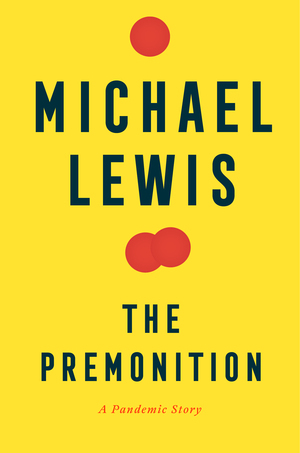 The Premonition by Michael Lewis
The Premonition by Michael LewisThe Premonition by Michael Lewis is a disturbing narrative by a popular nonfiction writer. During the George W. Bush administration, the country began to develop a pandemic response plan that included both vaccine development and social measures like masking, social distancing, and school closures. Meanwhile, various other researchers and public health officials were also attempting to understand how we should deal with a pandemic or, really, any outbreak of a communicable disease. Some of the momentum was lost during the Obama administration, but the book really jumps ahead to the disastrous response of the Trump administration to the COVID-19 pandemic and the dangerous politicization of the CDC. If we’d followed the previous plan, we’d all be a lot better off now.
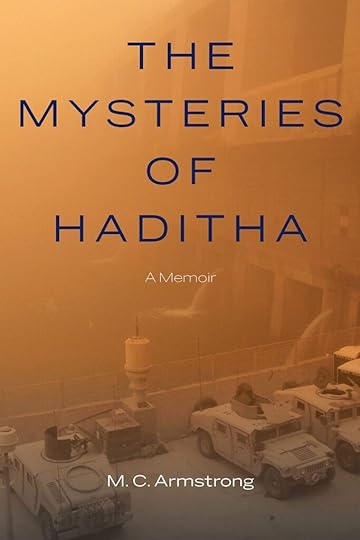 The Mysteries of Haditha by M.C. Armstrong
The Mysteries of Haditha by M.C. ArmstrongMysteries of Haditha by M.C. Armstrong is a short memoir in which a writer has the opportunity to be embedded with Navy Seals in Iraq. The plan causes anguish in his family, of course, and is difficult to arrange, but he goes and spends a week in Haditha. (The fact that it was only a week surprised me; it’s hard to see that much could really be learned in such a short period of time.) He discovers how much he doesn’t know, but he attempts to remedy that when he returns. Interestingly, the opportunity comes up because his high school buddy, who went to the Naval Academy, is a Navy Seal who is stationed in Haditha.
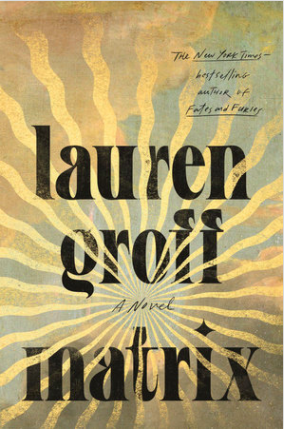 Matrix by Lauren Groff
Matrix by Lauren GroffMatrix by Lauren Groff is a puzzle. On Goodreads, I rated it 4 stars, not because I loved the book but because it’s impressive as hell as a work of art. Groff has immersed herself in 12th Century Angevin—the Anglo-French empire of the Middle Ages, and eventually, I gave up looking up the words I didn’t know for the animals, things, rituals, etc. that would have been commonplace at the time. And I read to the end of the book (not unusual—I always read to the end) in order to find out what becomes of Marie de France, the Abbess of a great monastery in England, even though, as a man, I felt unwelcome there. In Marie’s world, men are rapists (that’s how she was conceived), invaders, and meddling priests, and so she walls them out with her matrix. Nor does she need men for physical gratification, which she finds in her sisters and daughters, the other nuns. Is this Groff’s message? I’ve always enjoyed her work and was wowed by Fates and Furies, but this one I find unsettling and off-putting.
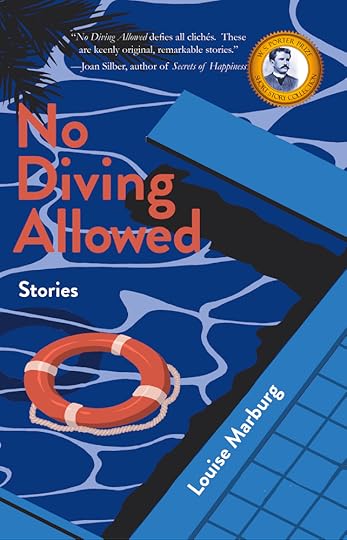 No Diving Allowed by Louise Marburg
No Diving Allowed by Louise MarburgNo Diving Allowed by Louise Marburg is a collection of stories by a friend from years ago at the Sewanee Writers’ Conference and more recently at the Virginia Center for the Creative Arts, and the book was published by Regal House Publishing, publisher of my recent novel, Oliver’s Travels. The stories are linked, but only in the sense that each has a swimming pool in it and the pool is usually somewhat central to the plot. There are lots of strained marriages and other family relationships, so that’s a linkage as well—husbands and wives fighting, sisters at each other’s throats, etc. And the stories also share a structure, in a way, in that the resolution of the story—the issue of what happens to the main characters after the climactic moment of the story—is truncated. I’ve always liked stories that have open endings, where some of the central questions remain unanswered, but here the endings are wide open, with the denouement only hinted at. That’s not a criticism, but just an observation of another way to end a story.
October 25, 2021
I’ve Got Questions for Mary Sullivan
Editor’s Note: This exchange is part of a series of brief interviews with emerging writers of recent or forthcoming books. If you enjoyed it, please visit other interviews in the I’ve Got Questions feature.
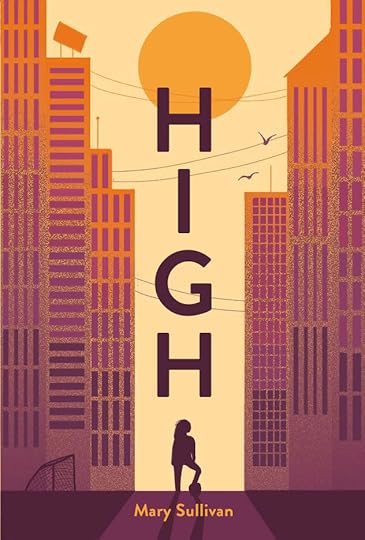 High by Mary SullivanWhat’s the title of your book? Fiction? Nonfiction? Poetry? Who is the publisher and what’s the publication date?
High by Mary SullivanWhat’s the title of your book? Fiction? Nonfiction? Poetry? Who is the publisher and what’s the publication date?High is a YA novel in verse, Fitzroy/Regal House Publishing, Pub Date: 10/25/2021
In a couple of sentences, what’s the book about?Fourteen-year-old Ceti is a star on the soccer field but struggles at home with her mother’s heroin addiction. Her life in constant upheaval, Ceti must find the courage to hold on to her dreams.
What’s the book’s genre (for fiction and nonfiction) or primary style (for poetry)?Realistic Fiction.
What’s the nicest thing anyone has said about the book so far?Vanessa Diffenbaugh (The Language of Flowers) said: “I love this book. In gorgeous, compelling prose, High tells the story of fourteen-year-old Ceti’s struggle to soar even as she lives through her mother’s life-threatening addiction. Mary Sullivan has written a beautiful, heartfelt book—I couldn’t put it down.”
What book or books is yours comparable to or a cross between? [Is your book like Moby Dick or maybe it’s more like Frankenstein meets Peter Pan?]Booked (Kwame Alexander) meets Crank (Ellen Hopkins).
Why this book? Why now?With the opioid crisis worsening, especially after Covid, it’s crucial for young readers to know there are other options than drugs (which seem to be everywhere), to be aware of their choices, and make the right decisions. Reading High would open conversations about drug use between children and grown-ups in a way that could change the directions of some lives.
Other than writing this book, what’s the best job you’ve ever had?I love teaching at Harvard Summer School and Harvard Extension School. I learn so much from my students and get so much back from them.
What do you want readers to take away from the book?I want readers to gain insight into the decisions they make about drugs before they are put in that situation, and for them to think about what they want most in their lives. I want to give them hope to believe in their dreams, big or small—something that matters rather than taking the easy way out.
What food and/or music do you associate with the book?Fast food! Donuts, burgers and fries, Mac n’ Cheese.
What book(s) are you reading currently?The Bluest Eye (Toni Morrison), The New Jim Crow (Michelle Alexander)
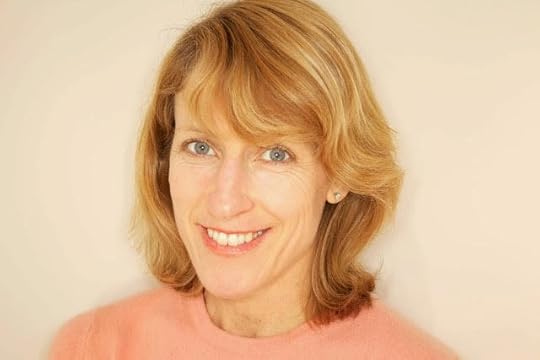 Mary Sullivan
Mary SullivanLearn more about Mary at her website
Follow her on Twitter and Instagram
Buy the book from the publisher (Fitzroy/Regal House), Amazon, or Bookshop.org.
October 21, 2021
Everywhere Stories SALE!
SALE SALE SALE–buy all three volumes for just $30 including shipping!
 Everywhere Stories: Short Fiction from a Small Planet, Volumes I, II, and III
Everywhere Stories: Short Fiction from a Small Planet, Volumes I, II, and IIINow through the month of November, I’m offering a bundle of all three editions of Everywhere Stories: Short Fiction from a Small Planet (each with a cover price of $19.95), for just $30 including shipping within the US. (Individual volumes can be purchased for just $15 including shipping).
“Travel invigorates and enlightens, and so does reading. You don’t have to go to the Congo to gain an understanding of the challenges women face there. You don’t have to go to Costa Rica to learn about resentment toward fly-by evangelism. You don’t have to go to Iran to sample Persian culture and anguish. When it’s done right—as the stories in this anthology are—fiction can transport you and show you the essential details, the soul of a place. A fiction writer is like an archaeologist in that way, digging, brushing away what doesn’t belong and revealing what a casual observer—a tourist—might miss. Read the book. Explore the globe. But remember, it’s a dangerous world.”
—from the Introduction in Volume I, by Clifford Garstang, editor
Each volume includes 20 stories set in 20 different countries by 20 writers. With international travel still difficult, this is a great way to explore the world without leaving your own home!
Check out the Table of Contents: Volume I, Volume II, and Volume III.
This is the lowest price ever for this bundle! Contact me at cliffgarstang@gmail.com with your name and shipping address and I’ll send you an invoice to pay via Paypal.
October 19, 2021
I’ve Got Questions for John Vanderslice
Editor’s Note: This exchange is part of a series of brief interviews with emerging writers of recent or forthcoming books. If you enjoyed it, please visit other interviews in the I’ve Got Questions feature.
 Nous Nous by John VandersliceWhat’s the title of your book? Fiction? Nonfiction? Poetry? Who is the publisher and what’s the publication date?
Nous Nous by John VandersliceWhat’s the title of your book? Fiction? Nonfiction? Poetry? Who is the publisher and what’s the publication date?The title of my book is Nous Nous. It is a novel, around 275 pages long. The publisher is Braddock Avenue Books and the release date is October 19.
In a couple of sentences, what’s the book about?The quickest way to describe Nous Nous is that it is an abduction story, but it is far more complicated than that. A 12-year-old girl is kidnapped from her middle school by an essentially gentle man who has decided to pick a moral fight with the universe. The investigation into the girl’s disappearance eventually involves a whole host of characters, including the girl’s mother, who is also an Episcopal priest; that woman’s angry ex-husband; and a student-teacher who is deeply inflicted with imposter syndrome but who ends up being, by pure happenstance, crucial to the case.
What’s the book’s genre (for fiction and nonfiction) or primary style (for poetry)?I would call it a literary crime novel. It’s entirely character driven but also, I believe, deeply suspenseful.
What’s the nicest thing anyone has said about the book so far?Gosh, I got such extraordinary early reviews from my readers that they almost made me blush. The novelist William Lychack said something that was really beautiful. This is what he wrote:
“If ever a novel sought to reveal the sacred in life… If ever a choir of voices and viewpoints came together with the design to lift hearts and hopes… Then Nous Nous is that collective of love and longing, of disappointment and loss and, ultimately, faith. There’s a beautiful dignity and grace to be found in these modest pages, and John Vanderslice is sublime in evoking these modest lives.”
I don’t know how I can ever do better than that.
What book or books is yours comparable to or a cross between? [Is your book like Moby Dick or maybe it’s more like Frankenstein meets Peter Pan?]Wow, that’s a good but tough question. This is going to sound like a rather odd combination, but I would have to describe my book as a cross between The Power and the Glory and Lolita. But there’s no pedophilia!
Why this book? Why now?Another great question. I actually first drafted this book eight years ago in a Novel Writing Workshop class. I was really happy about that draft when it was done, but it never got picked up anywhere. Over time as I re-worked the book and shaped it and edited it, I realized how that early draft just wasn’t the novel at its best self. Why this novel? Because it’s a story that is probing enough and human enough that it needs to be told. Why now? Because it’s actually really ready to appear. Finally. I’m convinced of that.
Other than writing this book, what’s the best job you’ve ever had?Well, I love my nine-to-five teaching job at the University of Central Arkansas. I actually can’t imagine having dedicated so much of my life to any other profession. That said, I got the hugest kick as an undergraduate working for my university’s student-run radio station. One year I was a sports broadcaster and the next a disc jockey. The summer between I interned at a radio station in Washington, DC. I found working for a radio station such a kick that back then I told myself “If I had a job offer in radio I would leave school right now to take it.” And I did try to find my way into the profession after I graduated. But it was not to be.
What do you want readers to take away from the book?I suppose I would want them to take away from the book the sense of how hard it can be sometimes to know what is the right thing to do, and that sometimes we end up blaming ourselves for things that we really could not control and/or could not know. And that is just not being fair to ourselves. Worse, it could end up destroying us. But having said that, I have a feeling your readers will say, “Of course, dummy. You think that’s news?”
What food and/or music do you associate with the book?Hmmm. I don’t really have soundtracks to what I write, partially because, as much as I love music, I find the writing goes better for me if I write in complete or near-complete silence. I’m boring that way. As for food, the only “food” that comes to mind in regards to this novel is ever-loving coffee! I wrote this novel in exactly two places: in my home study early in the morning (coffee, lots of coffee!) or on Wednesday evenings in a classroom with that class I was talking about earlier. I dedicated the second half of every weekly session to just writing our novels, and that meant that every Wednesday evening at break I went over to the campus Starbuck’s and loaded up with a venti dark roast. It was evening? Who cares? Writing (especially after a long day at the office) takes coffee!
What book(s) are you reading currently?Oh, you know, I always have a few going. On Audible, I am listening to the historical novel Hamnet by Maggie O’Farrell. I love to write, read, and teach the writing of historical fiction. (In fact, I am fortunate to be doing a class on that subject next semester.) I am also reading, in paperback, Postcolonial Love Poem by the unmatchable Natalie Diaz. She has such fire in her lines! And also, at night in bed, the novel Zoli by Colum McCann. Like everything McCann writes, it’s impeccable. But I’m not fully appreciating it because I keep falling asleep. I have to shift that book off my nightstand and onto my desk!
 John Vanderslice
John VandersliceLearn more about John at his website.
Follow him on Facebook and Twitter.
Buy the book from the Publisher (Braddock Avenue Books) or Amazon.
October 18, 2021
I’ve Got Questions for Laraine Herring
Editor’s Note: This exchange is part of a series of brief interviews with emerging writers of recent or forthcoming books. If you enjoyed it, please visit other interviews in the I’ve Got Questions feature.
 A Constellation of Ghosts by Laraine HerringWhat’s the title of your book? Fiction? Nonfiction? Poetry? Who is the publisher and what’s the publication date?
A Constellation of Ghosts by Laraine HerringWhat’s the title of your book? Fiction? Nonfiction? Poetry? Who is the publisher and what’s the publication date?A Constellation of Ghosts: A Speculative Memoir with Ravens. It’s a speculative memoir. Regal House Publishing, October 19, 2021.
In a couple of sentences, what’s the book about?Tag line: I was busy doing other things when cancer came, and my father, thirty years dead, returned to me as a raven.
What’s the book’s genre (for fiction and nonfiction) or primary style (for poetry)?Speculative memoir
What’s the nicest thing anyone has said about the book so far?“Laraine Herring has written a groundbreaking, breathtaking tour de force here, excavating personal and ancestral trauma as she blazes forth new possibilities for both narrative and healing. A Constellation of Ghosts is reckoning and revelation, deeply embodied, wholly visionary. This book is unlike anything you’ve ever read; this book will rock you to the marrow and leave you changed.” ~Gayle Brandeis, author of The Art of Misdiagnosis
What book or books is yours comparable to or a cross between? [Is your book like Moby Dick or maybe it’s more like Frankenstein meets Peter Pan?]Work by Janice Lee, Maggie Nelson, Chelsey Clammer, and Lidia Yuknavitch.
Why this book? Why now?This is my ninth book. I’m sorry, but I don’t know exactly how to answer this question. The books come to me that come, and they always come at the right time when I’m ready to handle what they’re offering to me. Every book offers a healing, and they arrive when I’m ready to do that work.
Other than writing this book, what’s the best job you’ve ever had?Working as a projectionist in a movie theater when I was in college. I loved watching the films over and over again in the dark like a bat.
What do you want readers to take away from the book?I want them to meet their own grief and sadness and form a new relationship with it. I’d love it if they could make space to forgive an ancestor or two as well.
What food and/or music do you associate with the book?Dark, cello music.
What book(s) are you reading currently?Seek You: A Journey through American Loneliness by Kristen Radtke, Imagine a Life by Janice Lee, and The Inner Work of Age: Shifting From Role to Soul by Connie Zweig.
 Laraine Herring
Laraine HerringLearn more about Laraine Herring at her website.
Follow Laraine on Facebook, Twitter, and Instagram.
Buy the book from the publisher (Regal House Publishing), Amazon, or Bookshop.org.
October 15, 2021
I’ve Got Questions for Lily Iona MacKenzie
Editor’s Note: This exchange is part of a series of brief interviews with emerging writers of recent or forthcoming books. If you enjoyed it, please visit other interviews in the I’ve Got Questions feature.
 The Ripening by Lily Iona MackenzieWhat’s the title of your book? Fiction? Nonfiction? Poetry? Who is the publisher and what’s the publication date?
The Ripening by Lily Iona MackenzieWhat’s the title of your book? Fiction? Nonfiction? Poetry? Who is the publisher and what’s the publication date?The Ripening: A Canadian Girl Grows Up, fiction, Pen-L Publishing, 10/15/21
In a couple of sentences, what’s the book about?This coming-of-age story follows Tillie Bishop from her early years until she turns eighteen. She never knew her father, so when her mother abandons her at fourteen, Tillie quickly becomes streetwise. Even in Calgary, forces of the ‘60s—a decade of rebellion, discovery, and upheaval—already are at work within her. Her grit and ability to face life’s challenges are inspiring, the seeds for her later discovery of her artist self.
What’s the book’s genre (for fiction and nonfiction) or primary style (for poetry)?Young Adult, New Adult, & Adult
What’s the nicest thing anyone has said about the book so far?“Lily Iona MacKenzie deftly takes readers into that throbbing, psychedelic world of drugs, booze, and one-night stands where they will root for Tillie as she struggles to find herself. You will be swept along as she painfully learns that true happiness is seldom found amid the glitter and grime. It’s hiding somewhere else … in plain sight. A well-written and visceral story.” Janice Gilbertson, author of Summer of ’58, Canyon House, and The Dark Side of Gibson Road
What book or books is yours comparable to or a cross between? [Is your book like Moby Dick or maybe it’s more like Frankenstein meets Peter Pan?]Since there are so few novels (or memoirs for that matter) about a female adolescent’s sexual awakening, it’s difficult to find another book to compare it to!
Why this book? Why now?And why not? Each novel gives us one writer’s particular view of the world through his/her characters. This novel featuring Tillie grew out of my last one, Freefall: A Divine Comedy, where an older Tillie, a zany installation artist, is the main character. Pen-L Publishing released that book as well and had contracted with me for three novels. I so enjoyed interacting with Tillie while I wrote Freefall that I wanted to better understand her origins. In the follow up, then, I went back to the ‘40s and ‘50s, to a world that flashed green and red lights at women, the era that produced Tillie (and me!). Some had begun to challenge the dead ends their futures seemed to hold, and Tillie ends up being one of those girls.
Other than writing this book, what’s the best job you’ve ever had?Teaching writing at the college level and beyond has been extremely gratifying for me. One thing I discovered when I was teaching rhetoric to college students, and still applies to the creative writing classes I currently teach for older adults, is that my writing of poetry, fiction, or non-fiction is like teaching for me. Both give me an opportunity to investigate ideas, fears, interests, and obsessions—to ask and answer questions. The two roles complement each other, writing being a more introverted activity than teaching. When I write, I do the dance of seven veils. I remain relatively hidden while exposing myself, exploring my mind and imagination in public view, trying to tempt the reader. When I teach, I do a similar dance. Some seduction is needed to catch a student’s attention and turn it towards the important art of them capturing their thoughts in writing conveying them to a reader.
But I’m learning, too, from my students’ successes and failures, growing along with them as a teacher and writer. However, growth requires a willingness to try new things, both on the teacher’s part and the student’s, so I also must create an atmosphere where such risks can take place. I need to be skillful not just in teaching the craft itself but in managing a classroom, in creating a space where students feel safe to experiment and explore.
What do you want readers to take away from the book?I hope readers will resonate with Tillie’s ability to cope as she faces a multitude of challenges in eventually finding her way in the world. It’s an inspirational story for all ages. We all must deal with difficult times. I believe that Tillie’s story will give readers the courage to take on their own trials.
What food and/or music do you associate with the book?Country western music as well as rock and roll. Food? The kind of good country cooking that Tillie grew up with: fried chicken, mashed potatoes, home-baked bread and cinnamon rolls. Not too many vegetables!
What book(s) are you reading currently?I’ve recently discovered the spy novel genre, and while I have no desire to try writing such fiction, I’m impressed with some of the literary narratives that writers such as Daniel Silva, Peter May, and Louise Penney are producing. At the moment, I’m caught up in Silva’s House of Spies.
 Lily Iona MacKenzie
Lily Iona MacKenzieLearn more about Lily on her website.
I’ve Got Questions for Thomas M. Atkinson
Editor’s Note: This exchange is part of a series of brief interviews with emerging writers of recent or forthcoming books. If you enjoyed it, please visit other interviews in the I’ve Got Questions feature.
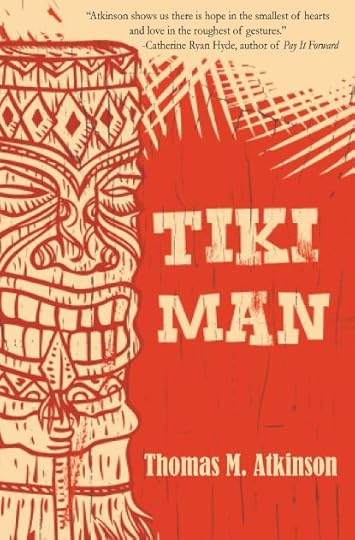 Tiki Man by Thomas M. AtkinsonWhat’s the title of your book? Fiction? Nonfiction? Poetry? Who is the publisher and what’s the publication date?
Tiki Man by Thomas M. AtkinsonWhat’s the title of your book? Fiction? Nonfiction? Poetry? Who is the publisher and what’s the publication date?Tiki Man, fiction, Friday, October 15, 2021, Regal House Publishing
In a couple of sentences, what’s the book about?Pere and Tammy are an accidental family wandering in the land of temporary tags and disability checks on a grubby crust of Florida, and it takes place over a single day. It’s also about fried baloney, homeopathic mythology, and why we make art.
What’s the book’s genre (for fiction and nonfiction) or primary style (for poetry)?Southern Lit, but not southern gothic. How about upmarket Appalachian?
What’s the nicest thing anyone has said about the book so far?The daughter of my professor, mentor, and friend when I was an undergrad read it and wrote, “Without hesitation, I can say Dallas [Wiebe] would be very proud of you.”
What book or books is yours comparable to or a cross between? [Is your book like Moby Dick or maybe it’s more like Frankenstein meets Peter Pan?]I am famously terrible at this. Maybe the movie The Florida Project with a shot of Portis’ True Grit? True Grit without the horses and gunplay, but with that sense of mutual surrogacy, that who exactly is taking care of who at any given moment is very fluid.
Why this book? Why now?All of my characters are on the edge of things, struggling to get by with the hand they’ve been dealt, and they are folks you might cross the street to avoid and pass easy judgment on. Money buys more tools to solve problems, and my characters are doing the best they can with very limited toolboxes. And I don’t think it’s ever a bad time to be reminded that empathy is what makes us human.
Other than writing this book, what’s the best job you’ve ever had?I should say, “Raising my two sons, stay-at-home dad, blah, blah, blah.” But if by “best” you mean “fun,” that would be the summer I put together and launched the banners that planes tow around the ballpark (“JACK SAYS IN KY WE DRINK PABST”). Good money, high adrenaline, and as a bulletproof young man, pegging the speedometer of a ragged-out LTD station wagon down an airport runway is about as much fun as you can have with your pants on.
What do you want readers to take away from the book?Oh, I don’t want to tell anybody what their take away should be. One of my short stories won a contest, and the judge wrote, “Last, and most important, I fell in love with Jeri’s voice. She is tough, wise, and kind, her heartaches and triumphs so honestly rendered that for the length of this piece I believed she was real, out there somewhere, whispering her story to me.” So, yeah, that’s all I want, for Tammy and Pere, Doris and Missy, Clyde and Vera, Barry and Del Ron, Duane and Pearl, Standing Bear and Oxana, and even Officer Orange and Tampon John to be alive out in the world for the reader, that they catch themselves wondering what they are up to now.
What food and/or music do you associate with the book?This is a great question! As my long-suffering wife will tell you, I will listen to one song over and over and over again when I’m writing. Sometimes it has to do with what I’m writing and sometimes not (What does Frank Ocean’s “Nikes” have to do with a campground gone-to-seed? Not a damn thing, except that it’s the closest recreation of being high that music can achieve). It’s also a great trick to get you back to the same mental space when you have to take a break from a piece. There were a bunch of different songs for Tiki Man. As a matter of fact, I just took a trip down memory lane – it’s easy to find them because I just scroll through my iTunes and find the songs with 300+ plays. Food? Perfectly toasted marshmallow.
What book(s) are you reading currently?Right now I’m revisiting some of Samuel R. Delany’s science fiction. I just finished Nova, am waiting on a used copy of Triton, and Dhalgren (all 900 pages of it) is on deck. I’m just now realizing how much his work influenced everything that came after it, from William Gibson to George Lucas.
 Thomas M. Atkinson
Thomas M. AtkinsonLearn more about Thomas on his website.
Buy the book from the publisher, Amazon, or Bookshop.org.



